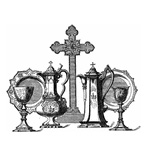
All Catholics Should Major in Double E
REVERT'S ROSTRUM
And I don’t mean electrical engineering. Rather, the “Double E” I speak of is the episcopacy and the Eucharist, which, when understood in concert, represent two essential hinges of Catholic apologetics. The better equipped Catholics are to explain the role of the episcopacy and the Eucharist in Catholic ecclesiology, the more effective they will be in communicating to non-Catholics what is truly unique and intellectually compelling about the Church.
The “Double E” apologetic presented an indomitable force when I was a Calvinist seminarian contemplating the difference between Reformed and Catholic theologies. Any Protestant who spends enough time reading the New Testament starts to realize that ecclesiology is important. Jesus incontestably founded a Church (cf. Mt. 16:18). That Church had an easily recognizable leadership — namely, the Apostles and other leaders designated by the Apostles (cf. Acts 2:42-43, 15:1-35). And that Church was visible, composed of both sincere believers and those in varying degrees of unbelief or disobedience — this is apparent given Jesus’ comments about the wheat and the tares (cf. Mt. 13:24-30), St. John’s statement about some Christians leaving the Church because “they were not of us” (1 Jn. 2:19), and St. Paul’s first letter to the church in Corinth, in which he reprimands some members for egregiously immoral behavior that, one would think, if gone unrepented, would disqualify them from salvation.
As a Calvinist, I realized that a person who identifies as a follower of Christ should be part of something that constitutes the visible Church. But which one? Every denomination or independent ecclesial body claims to represent faithfully Christ’s teaching and mission. Even when groups of Protestants come together and recognize some manner of “mere Christianity,” they necessarily exclude others based on any number of criteria: beliefs about the nature of the Bible, the nature of Christ, how one is saved, etc. No principle exists, apart from Holy Scripture, to evaluate competing claims. Yet anyone who surveys contemporary Christianity, or Christian history, knows that there are many competing, conflicting interpretations of the Bible. And the Bible is incapable of arbitrating between these interpretations — you can’t ask it to tell you more than what’s written in its pages.
Catholicism, however, offers a coherent alternative paradigm: the first “E,” the episcopacy. As Pope St. John Paul II observed, the Church is a structured society. Beyond what I’ve outlined above, the New Testament also tells us that Christ intended the Church to be hierarchical, and He granted the Apostles unparalleled authority to represent Him among His followers and to the world. We see this in how the Acts of the Apostles discusses the greatest controversy of the post-Resurrection Church: the status of Gentile converts to Christianity. At a council in Jerusalem, recorded in Acts 15, “the apostles and the elders” convened to discuss the controversy. St. Peter, the chief Apostle, offered his opinion, which was then endorsed by St. James, who, early Christian tradition tells us, was the first bishop of Jerusalem. Moreover, the corpus of letters contained in the New Testament points to the Apostles as principles of unity, forming and guiding the practices and teachings of the early Church. There is ample biblical and historical evidence that the Apostles handed down this authority to designated successors (cf. Acts 1:21-26; 1 Tim. 1:6, 4:14, 5:22).
You May Also Enjoy
The people of the USA are unwilling to make the right to a job a top priority and to get up the money to pay for it, even though they can easily afford to do so.
America’s conception of sex is downright sophomoric, and its overhaul starts with understanding what sex is and what it is for.
We followers of Christ are likewise called to thirst for souls, to burn with desire to see others saved — not only our family and friends but everyone we meet.

